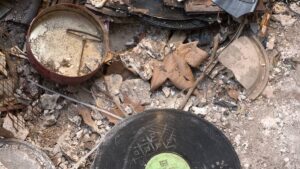Dr Boreham’s Crucible: Regeneus has pain sorted; now for long-term gain

Pic: sinology / Moment via Getty Images
Flush with fresh funding, stem cell play Regeneus (ASX: RGS) declares its next step is to strike a partnering deal in Japan pertaining to its lead osteoarthritis treatment Progenza.
This confident assertion, accompanied by a $5.54 million capital raising, lifts a burden of guilt for your columnist, who late last year put the mozz on the company by describing its board – barely changed since the company’s listing in 2013 – as remarkably stable.
Lo and behold, in January CEO John Martin resigned to pursue other opportunities, to be replaced by existing director Leo Lee.
Martin stayed on as a director, but in early April both he and chairman (and biotech legend) Dr Roger Aston resigned.
As the Aston-Martin combo motored off, they were replaced with another biotech hero, Dr John Chiplin and Florida-based Dr Alan Dunton, who has sat on more life sciences boards than he has consumed syrupy waffles for breakfast.
The rationale behind the management shake-up is to sharpen the company’s focus on neuropathic pain; a quest that has been vindicated by positive new clinical results (see below).
Regeneus’s institutional investors like what they hear, having subscribed $2.34 million in a placement at eight cents apiece. The company is now in the throes of a one-for-six rights issue to raise up $3.2 million more.
Who let the dogs out?
With patents in the US, Europe and Japan, Regeneus began with adipose (fat) based stem cells for knee joints in dogs – and hopefully humans – but has changed its focus to mesenchymal stem cells. More specifically, it’s about the secretions from these cells that have the ability to be clinically developed to treat multiple candidates.
Progenza is an off the shelf (allogeneic) treatment for osteoarthritis pain. Progenza cells secrete cytokines – a protein that regulates the cells and sends signals to them – and other growth factors.
Osteoarthritis pain is usually treated with non-steroidal anti-inflammatory drugs, which can induce side-effects including stomach ulcers and gastro-intestinal bleeding.
The company’s second product, Sygenus, is a topical acne treatment. It has also shown a strong analgesic effect in post-operative pain studies, with longer lasting effects compared with morphine.
While Progenza has been subject to phase I testing, Sygenus is at the laboratory stage.
Regeneus focuses on a subset of secretions called exosomes, which are not a direct regeneration agent but signal to the body that a cartilage (or other defective part) should be repaired.
Regeneus was the brainchild of inventor Prof Graham Vesey and was founded by Prof Vesey and Dr Benjamin Ross. Both have strong Macquarie University links.
Chipping in for Dr Chiplin
Dr Chiplin is the managing director of biotech wheeler and dealer New Star Ventures. He is also on the boards of the ASX listed Adalta, the London-listed immunotherapy play Scancell Holdings and the private Batu Biologics.
Up to mid-May he was on the board of ASX listed stem-cell chum Cynata Therapeutics.
But he is best known here for heading ASX-listed cancer immunotherapy house Arana Therapeutics (formerly Peptech with Evogenix inside), which Cephalon Inc (now Teva) acquired in July 2009 for $329 million – a 70 per cent premium despite the ravages of the global financial crisis.
Dr Chiplin also is very adept at passing the hat, having mustered GBP20 million ($A36 million) for Scancell. He also steered the ASX-listed gene-silencing play Benitec’s Nasdaq listing that raised $46 million (okay, Benitec’s fortunes have soured since then and the company’s in danger of being turfed from the Nasdaq, but that’s not the point).
“That’s where my Rolodex comes in handy,” Dr Chiplin says. “Like other Aussie biotechs, Regeneus needs to think global for funding. In one block of Manhattan there’s more money for life sciences than the whole of Australia – but it’s not easy money.”
Dr Dunton founded the pharma consultancy Danerius LLC.
Mr Lee meanwhile was Japanese president of Merck, Sharp and Dohme and Allergan and is fluent in Japanese and Mandarin. As Matildas’ skipper Sam Kerr would say, “Suck on that Kevin Rudd”.
Turning Japanese
As with ASX-listed stem cell peers Mesoblast and Cynata, Japan is a tempting market for Regeneus because of favorable regulatory settings and a creaking, ageing population.
Regeneus has a 50:50 manufacturing partnership with AGC, an arm of Mitsubishi AGC Asahi Glass. But it’s also been working on that elusive partnership to distribute its knee osteoarthritis product in Japan.
Last November, management promised that, like the Great War, it would be done and dusted by Christmas that year.
“It’s a work in process, it’s been mooted for a while,” concedes Dr Chiplin, who describes Japan as “one of the most enlightened regulatory environments in the world”.
In Japan, Mesoblast is marketing the graft-versus-host disease treatment Temcell (acquired from Osiris in 2014).
Cynata is partnered with Fujifilm for its graft-versus-host disease treatment Cymerus, but like a nervous suitor it’s waiting for Fujifilm to commit (Cynata has also fielded a non-binding takeover offer from another party).
- Subscribe to our daily newsletter
- Join our small cap Facebook group
- Follow us on Facebook or Twitter
Mr Lee says Regeneus intends to commence a phase II study in Japan “in the near future” – probably 2021.
“We expect to have a product in market in 2023, which is very good news for us,” he says.
Works in rats
Last month Regeneus also announced the results of pre-clinical work undertaken at the University of Adelaide, under an Australian Research Council linkage grant between the aforementioned Crow-eaters’ College, the University of New South Wales and the company.
The rat model showed a single injection of Progenza “completely reversed” the symptoms of allodynia: pain from normally non-painful contact such as a light touch.
Supervising boffin Prof Mark Hutchinson said: “In our experience of developing pain treatment interventions, it is uncommon to identify treatments that create long-lived reversal of exaggerated pain states lasting weeks after single doses.”
Finances and performance
Regeneus’s fund raising is a necessary and welcome development given the company had a slender cash balance of $255,000 at the end of the June quarter.
“If fully subscribed the total funds raised … will provide the company with sufficient runway to secure a commercialization licencing deal for Progenza for osteoarthritis in Japan,” the company says.
Regeneus also has a $4.38 million loan from specialist financier Paddington Street Finance, of which $600,000 remains available.
The loan is repayable at the earlier of the expected 2018-’19 Federal Research and Development Tax Incentive, the next milestone from AGC under the manufacturing licence, or September 30, 2019.
If a Japan licencing deal is struck, AGC pays an undisclosed milestone.
Directors have also provided $2.5 million in loans, $1.4 million of which will be converted to equity, partially to underwrite the rights issue. Directors Barry Sechos and Glen ‘Shark Tank’ Richards will also chip in a further $400,000 of equity.
Regeneus stock peaked at 60 cents in November 2013, shortly after listing at 25 cents a share.
The shares hit a record low of 6.5 cents in late June, but they’re now trading above the eight cents a share offer price.
Dr Boreham’s diagnosis:
While Regeneus has always been interested in pain, this focus will become more laser-like after it disposes of its cancer vaccine and animal health businesses.
“They’re good businesses and we intend to fully monetise them and bring value to our shareholders,” Mr Lee says.
Dr Chiplin adds that both assets are valuable and there won’t be any “knee jerk reaction”.
Lest anyone needs reminding, pain is a vast market. Datamonitor Healthcare puts the size of the neuropathic pain market globally at $US69 billion ($98 billion) and forecasts it to grow to $US79 billion by 2024.
“Everyone experiences pain at some point in their lives,” Dr Dunton told Stockhead. “It’s part of being a human being.”
Back in November we said the proof of Regeneus’s success “lies in sealing the vaunted Japanese deal and we always get nervous when boards nominate timelines for these transactions which are notoriously hard to execute”.
Guess what? We’re still biting our nails.
But if anyone can lead the company to the Promised Land – and perhaps even elicit a buyer – it’s the good Dr Chiplin.
“With Australian [biotech] companies like Regeneus producing good results there will be other shoes to drop with the industry maturing and turning platforms into products,” he says.
“If Regeneus is still around in five years [that is, not acquired] we would like to see the company with a broad range of products associated with pain and inflammation, with a number of well-advanced products.”
If that happens, you can add a few noughts to the company’s valuation.
Disclosure: Dr Boreham is not a qualified medical practitioner and does not possess a doctorate of any sort. He has sat on zero biotech boards but is fluent in English and has had many hot breakfasts.
This column first appeared in Biotech Daily.
The content of this article was not selected, modified or otherwise controlled by Stockhead. Stockhead has not provided, endorsed or otherwise assumed responsibility for any financial product advice contained in this article.
UNLOCK INSIGHTS
Discover the untold stories of emerging ASX stocks.
Daily news and expert analysis, it's free to subscribe.
By proceeding, you confirm you understand that we handle personal information in accordance with our Privacy Policy.








